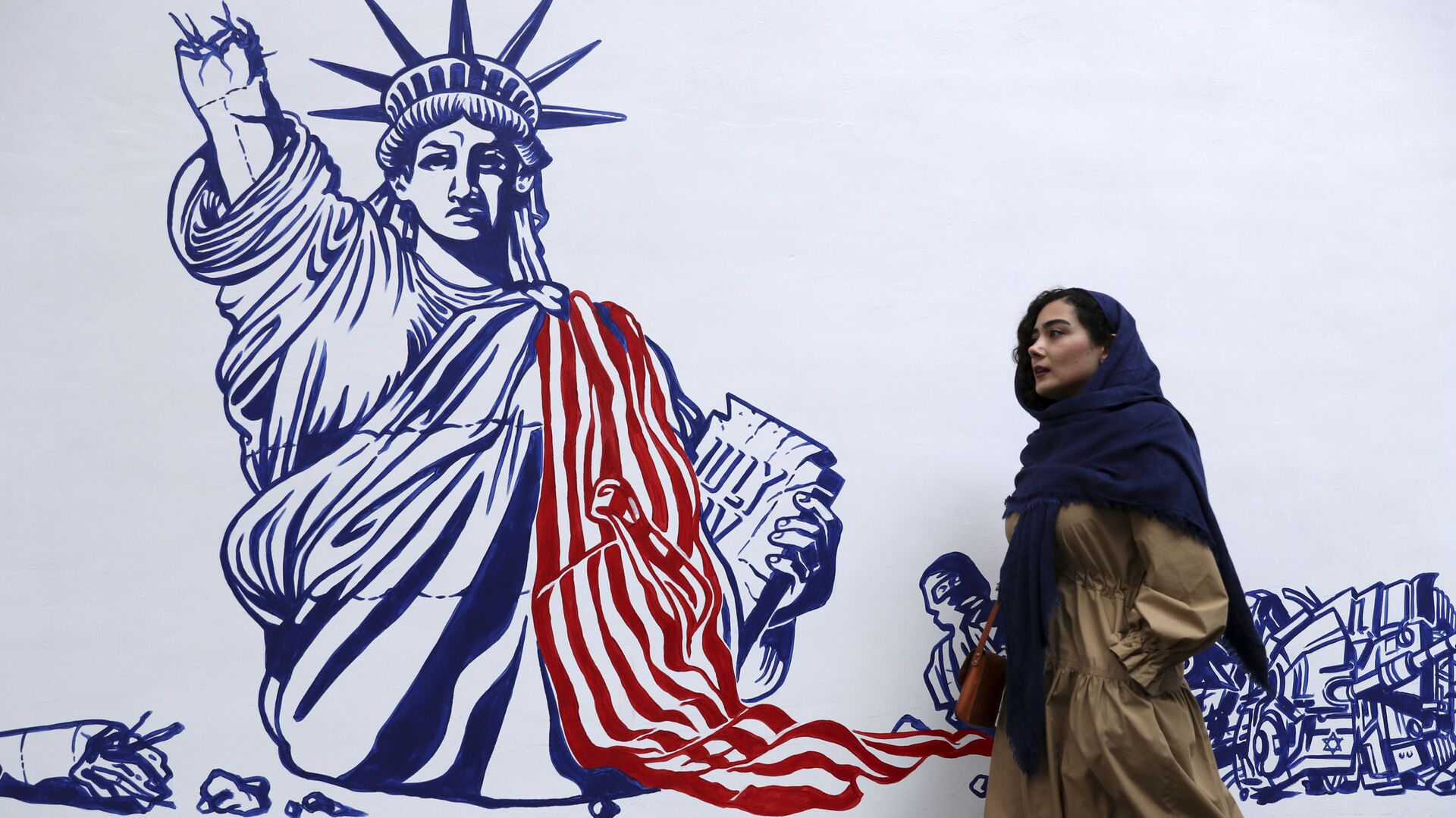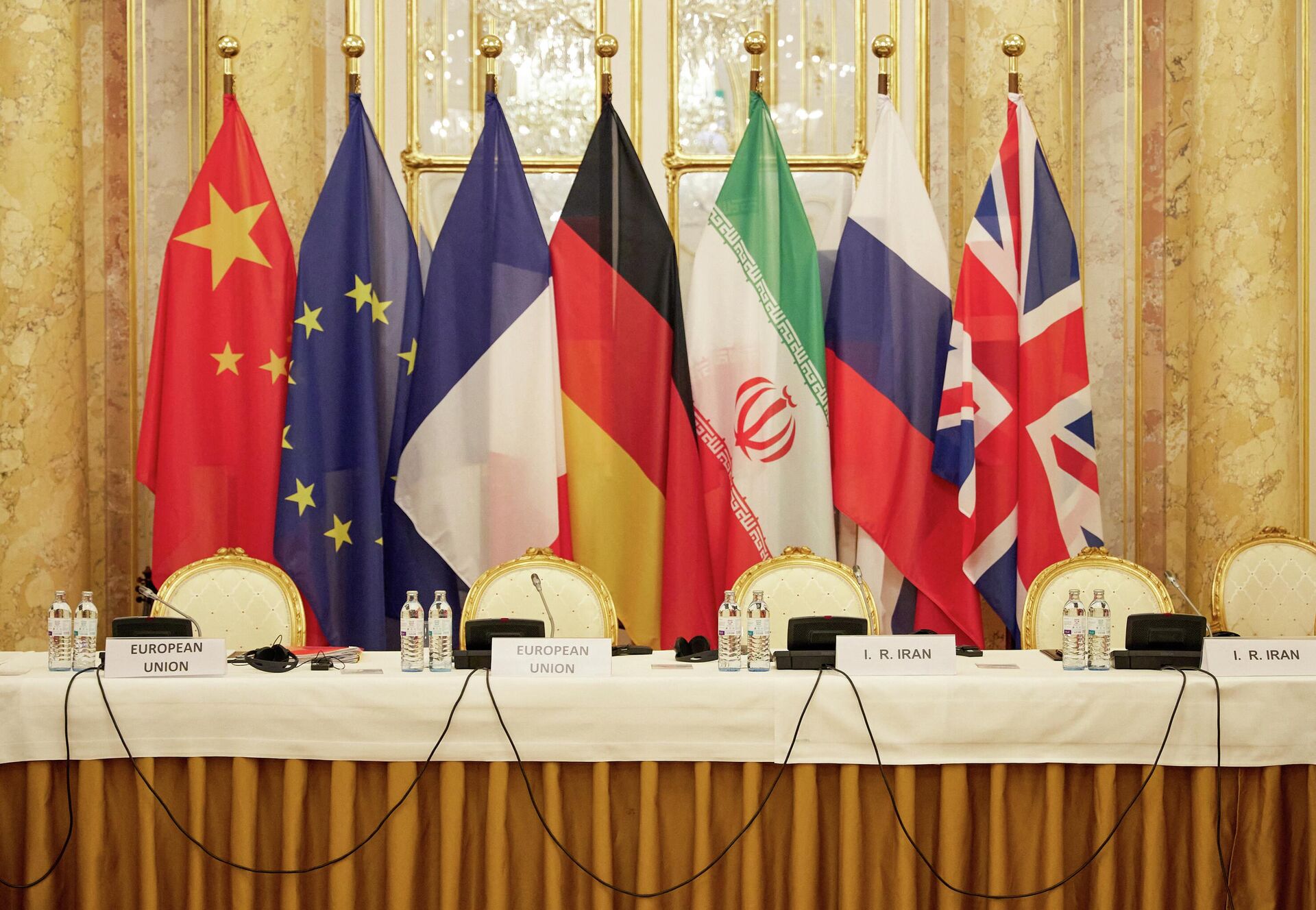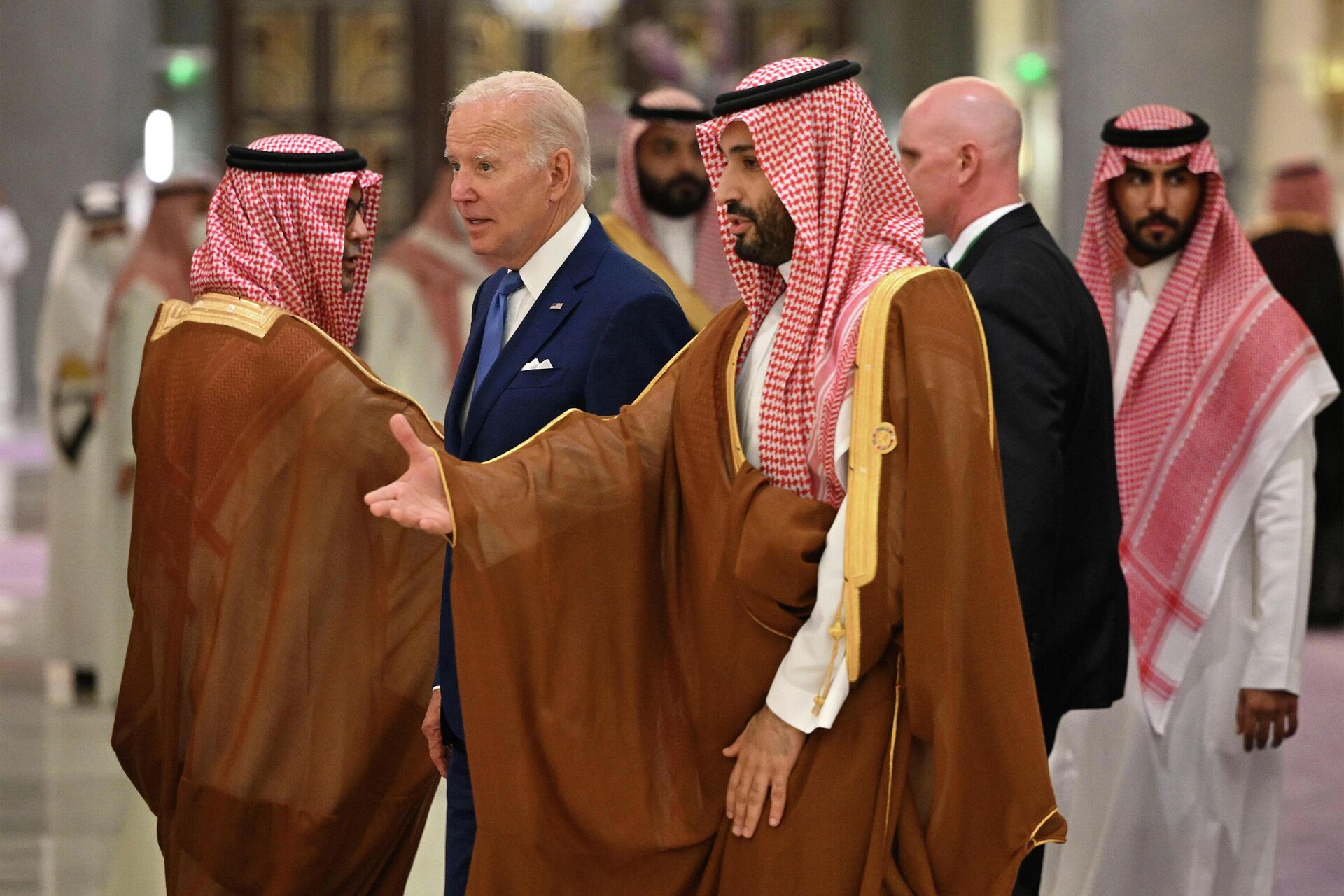https://sputnikglobe.com/20220717/us-not-in-position-to-dictate-its-will-has-no-option-but-to-strike-deal-with-iran-says-official-1097390089.html
US Not in Position to Dictate Its Will, Has No Option But to Strike Deal With Iran, Says Official
US Not in Position to Dictate Its Will, Has No Option But to Strike Deal With Iran, Says Official
Sputnik International
After Russia launched its special military operation in Ukraine on February 24, the US and its Western allies have slapped multiple sanctions on Moscow. Those... 17.07.2022, Sputnik International
2022-07-17T05:23+0000
2022-07-17T05:23+0000
2022-07-17T05:23+0000
us
iran
oil
deal
joe biden
middle east
https://cdn1.img.sputnikglobe.com/img/107721/45/1077214512_0:0:3135:1763_1920x0_80_0_0_6c21e470efbf79719ae0980b21b514d8.jpg
On Saturday, US President Joe Biden wrapped up his trip to the Middle East, where he met with a number of leaders from oil producing countries, such as Saudi Arabia, the United Arab Emirates and Iraq.In Jeddah, the Saudi leadership reassured Biden that they would work closely with the United States to stabilize the global energy market, which has witnessed an unprecedented spike in prices. Experts, in the meantime, have warned that Riyadh has already reached its maximum capacity. Thus, it will not be able to pump more oil. Nor will it want to breach its contract with other members of the Organization of Petroleum Exporting Countries (OPEC), which is poised to meet August 3.Under such circumstances, Washington, which is determined to resolve the energy crisis -- might not have any option but to seek other partnerships. and Iran could potentially provide the solution.How Ready is the US for a Deal?Prof. Mohammed Marandi, a media advisor to Iran's nuclear negotiations team, says his country is willing to strike a deal with Washington but also stresses that the Americans should come up with concessions, as they "cannot have their cake and eat it too".Iran has been involved in nuclear talks with the US and its western allies since November 2021. During those negotiations, the West has repeatedly insisted that Iran should grant it the possibility to supervise its nuclear program, claimed by the West to be pursued for military options. Iran, on its part, has denied those allegations and demanded the removal of all sanctions that impede the full implementation of the nuclear deal as a precondition to any agreement.Those demands, says Marandi, have not been met. Instead, the Western media has alleged that the deal was stuck due to Iran's demands to remove its Revolutionary Guards, the main military force of the Islamic Republic, from the US list of terror organizations, something that Washington found hard to accept.Marandi struggles to understand what prompts Washington to engage in such conduct at a time when the world is submerged in an acute energy crisis, following Russia's military operation in Ukraine that kicked off in February. He alleges that part of the problem could lie in "America's internal politics" or "the weak position of the Democratic party". In any case, says the media advisor, the US is not in a strong position to act against Iran and hence the best option for them is to strike a deal and get the Iranian crude flowing into the European market.According to estimates, Iran has proven reserves of 157 billion barrels, which amounts to 10 percent of all oil reserves. It is also equivalent to 13 percent of what the OPEC states have to offer.Due to Western sanctions, Europe has been boycotting Iranian oil since 2012. In response, Tehran has offered its services in Asia, where it found loyal clients in China and India.Fierce ObjectionsHowever, the removal of sanctions is expected to face strong objections, especially in the Gulf, where some believe that such a step would only strengthen Iran. It would enable the Islamic Republic to gain more funds and invest them in military and nuclear capabilities. And that makes several Arab states worried.That fear has already prompted the Gulf to work on a possible military alliance with such regional players as Egypt, Jordan and Israel. Although nothing official has been announced, reports suggest that those parties are advancing a joint aerial defense agreement. But Marandi is certain the pact could not challenge Iran.During his trip to the Middle East, Biden reiterated that he believed a military option was not on the table and that diplomacy was the only way forward. Marandi says that in reality, he hasn't differed much from his predecessor Donald Trump, who preferred to stick to his "maximum pressure" policy.This is why, Marandi is sending a clear message to Washington that if they truly want a deal, they need to back their words with actions.
iran
Sputnik International
feedback@sputniknews.com
+74956456601
MIA „Rosiya Segodnya“
2022
News
en_EN
Sputnik International
feedback@sputniknews.com
+74956456601
MIA „Rosiya Segodnya“
Sputnik International
feedback@sputniknews.com
+74956456601
MIA „Rosiya Segodnya“
us, iran, oil, deal, joe biden, middle east
us, iran, oil, deal, joe biden, middle east
US Not in Position to Dictate Its Will, Has No Option But to Strike Deal With Iran, Says Official
After Russia launched its special military operation in Ukraine on February 24, the US and its Western allies have slapped multiple sanctions on Moscow. Those measures have sent oil prices through the roof, compelling Washington to seek solutions.
On Saturday, US President Joe Biden wrapped up his trip to the Middle East, where he met with a number of leaders from oil producing countries, such as Saudi Arabia, the United Arab Emirates and Iraq.
In Jeddah, the Saudi leadership reassured Biden that they would work closely with the United States to stabilize the global energy market, which has witnessed an unprecedented spike in prices. Experts, in the meantime, have warned that
Riyadh has already reached its maximum capacity. Thus, it will not be able to pump more oil. Nor will it want to breach its contract with other members of the Organization of Petroleum Exporting Countries (OPEC), which is poised to meet August 3.
Under such circumstances, Washington, which is determined to resolve the energy crisis -- might not have any option but to seek other partnerships. and Iran could potentially provide the solution.
How Ready is the US for a Deal?
Prof. Mohammed Marandi, a media advisor to Iran's nuclear negotiations team, says his country is willing to strike a deal with Washington but also stresses that the Americans should come up with concessions, as they "cannot have their cake and eat it too".
Iran has been involved in nuclear talks with the US and its western allies since November 2021. During those negotiations, the West has repeatedly insisted that Iran should grant it the possibility to supervise its nuclear program, claimed by the West to be pursued for military options. Iran, on its part, has denied those allegations and demanded the removal of all sanctions that impede the full implementation of the nuclear deal as a precondition to any agreement.
Those demands, says Marandi, have not been met. Instead, the Western media has alleged that the deal was stuck due to Iran's demands to remove its Revolutionary Guards, the main military force of the Islamic Republic, from the US list of terror organizations, something that Washington found hard to accept.
"This issue has never been a pre-condition for Iran. It has been used to justify stonewalling. What has been an issue is America's history of partial implementation and violation of the Joint Comprehensive Plan of Action, something that Iran finds unacceptable, and the reluctance of Washington to remove its sanctions."
Marandi struggles to understand what prompts Washington to engage in such conduct at a time when the world is submerged in an acute energy crisis, following Russia's military operation in Ukraine that kicked off in February.
He alleges that part of the problem could lie in "America's internal politics" or "the weak position of the Democratic party". In any case, says the media advisor, the US is not in a strong position to act against Iran and hence the best option for them is to strike a deal and
get the Iranian crude flowing into the European market.According to estimates, Iran has proven reserves of 157 billion barrels, which amounts to 10 percent of all oil reserves. It is also equivalent to 13 percent of what the OPEC states have to offer.
Due to Western sanctions, Europe has been boycotting
Iranian oil since 2012. In response, Tehran has offered its services in Asia, where it found loyal clients in China and India.
"There is no shortage of customers," reassures Marandi. "As we speak, Iran is selling more of its oil at a market price. So it is doing pretty well. If sanctions were to be removed, Iran would be able to increase production," Marandi says.
However, the removal of sanctions is expected to face strong objections, especially in the Gulf, where some believe that such a step would only strengthen Iran. It would enable the Islamic Republic to gain more funds and invest them in military and nuclear capabilities. And that makes several Arab states worried.
That fear has already prompted the Gulf to work on a
possible military alliance with such regional players as Egypt, Jordan and Israel. Although nothing official has been announced, reports suggest that those parties are advancing a joint aerial defense agreement. But Marandi is certain the pact could not challenge Iran.
"There is no regional country that can be considered a rival to Iran," he reassures. "Our only rival is the US. Israel and Saudi Arabia are small and weak. Iran is the most military developed country in western Asia".
During his trip to the Middle East, Biden reiterated that he believed a military option was not on the table and that diplomacy was the only way forward. Marandi says that in reality, he hasn't differed much from his predecessor Donald Trump, who preferred to stick to his "maximum pressure" policy.
This is why, Marandi is sending a clear message to Washington that if they truly want a deal, they need to back their words with actions.
"The US is not in a position now to escalate the situation. If they do, it will only send prices through the roof and that would ironically benefit Iran. The smart thing for them to do is to strike a deal. We are prepared for it."





